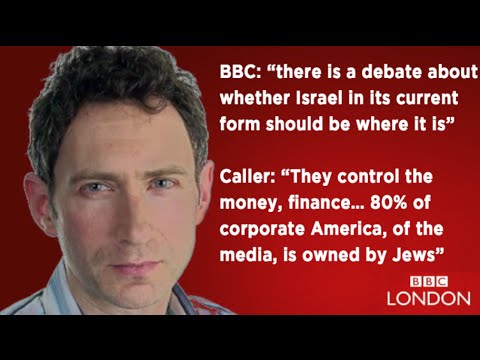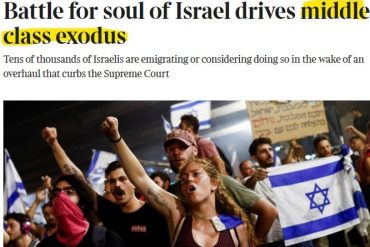Brought to us by the Campaign Against Antisemitism, the audio clip available here comes from a phone-in programme broadcast on BBC Radio London on December 22nd and hosted by Simon Lederman.
That inadequately challenged collection of classic antisemitic tropes, conspiracy theories and factual inaccuracies has obviously raised concerns and via the Jewish News we learn that the BBC has responded as follows:
“A BBC spokesperson said: “The aim of the programme is to discuss and debate issues raised by our listeners. This was a live phone in and the caller was challenged on his views throughout the conversation. Following the interview reaction from other listeners was also broadcast.””
But was the caller really “challenged on his views throughout the conversation” and were obvious inaccuracies corrected by the presenter?
The repeated claim that “Zionist Jews” control and “own” the Bank of England, the Federal Reserve, corporate America and the media was not adequately challenged: at no point did the presenter inform listeners that those claims are simply untrue.
The inaccurate claim that “most of the Jews of the world” come from “an empire called Khazaria” was not challenged at all. That perhaps is a little less surprising when one considers that the BBC has previously given airtime to the main proponent of that myth.
The inaccurate assertion that “real” Judaism “has nothing to do with Zionism” was not challenged and neither were the inaccurate claims that “Balfour created essentially the State of Israel” and that “the British had a protectorate” in Palestine. Indeed the reaction from the presenter to those last two inaccuracies was to say “right”.
Moreover, Lederman himself fed listeners historical factual inaccuracies.
“I mean in terms of Zionism and in terms of the creation of Israel, I was under the impression – and I’m sure many of our listeners were too – that came out of the end of the Second World War where the League of Nations – slash United Nations as they later became – decided that was probably one of the best solutions in order to ensure the safety of a race of people who were almost exterminated in the Second World War. You don’t believe that’s the case?”
The BBC presenter also found it appropriate to mainstream the notion that discussion of whether or not one sole member state of the United Nations should exist is legitimate.
“And there is a debate – listen, I’m not saying there is no debate – clearly there is a debate about whether Israel in its current form should be where it is, whether the rights of the Palestinians have been outweighed by the rights of the Israelis, whether some of the decisions that were made – possibly some would perceive as in haste at the end of the Second World War – were the right decisions….”
The BBC’s editorial guidelines on Harm and Offence include the following words:
“We aim to reflect fully and fairly all of the United Kingdom’s people and cultures in our services. Content may reflect the prejudice and disadvantage which exist in societies worldwide but we should not perpetuate it. In some instances, references to disability, age, sexual orientation, faith, race, etc. may be relevant to portrayal. However, we should avoid careless or offensive stereotypical assumptions and people should only be described in such terms when editorially justified.” [emphasis added]
And:
“The Agreement accompanying the BBC Charter requires us to apply “generally accepted standards so as to provide adequate protection for members of the public from the inclusion of offensive and harmful material“.”
The dissemination and mainstreaming of classic antisemitic tropes concerning Jews, power and money is clearly both offensive and harmful.
BBC guidance concerning live output states:
“If offensive comments are expressed during live interviews, the interviewer should normally intervene, challenge the comments where appropriate and/or distance the BBC from the comments. If this doesn’t happen we should make an on-air apology at the earliest opportunity. Offensive comments include remarks that may be interpreted as, for example, racist, sexist, homophobic, prejudiced against a religious group, or reflecting an unflattering national stereotype.”
The OFCOM guidance notes on Harm and Offence state:
“Racist terms and material should be avoided unless their inclusion can be justified by the editorial of the programme. Broadcasters should take particular care in their portrayal of culturally diverse matters and should avoid stereotyping unless editorially justified. When considering such matters, broadcasters should take into account the possible effects programmes may have on particular sections of the community.”
In his July 2015 address on the topic of extremism the British Prime Minister spoke about “certain intolerant ideas which create a climate in which extremists can flourish” and in that category he included “ideas also based on conspiracy: that Jews exercise malevolent power…”.
The fact that a BBC presenter not only failed to adequately challenge precisely such conspiracies but – as he himself stated – gave this particular caller “more [time on air] than I have done anyone” should clearly be cause for serious concern.
Resources:
BBC Radio London contact details




